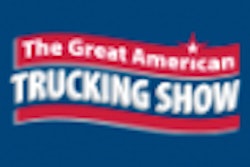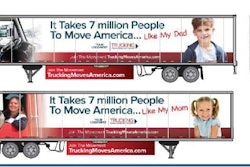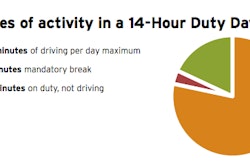CRST Expedited (No. 17 in the CCJ Top 250) has filed an exemption request with the Federal Motor Carrier Safety Administration (FMCSA) asking the agency to allow some CRST drivers to use split sleeper berth time to satisfy federally required sleeper berth time.
The request comes shortly after the FMCSA’s decision in March to allow private carrier McKee Foods’ team drivers to use 5/5, 4/6 or 3/7 split sleeper berth periods to satisfy the required 10 hour off-duty time.
CRST’s exemption request mirrors McKee’s: The carrier wants its team drivers to have the same flexibility with their 10-hour off-duty time. In exchange for the waiver, CRST is offering concessions like reducing allowed driving time from 11 hours to 10, using electronic logging devices to keep up with on-duty time and hours compliance, equipping tractors used by exempted drivers with speed limiters that limit speeds to 65 mph and equipping all of the vehicles in use by exempted drivers with collision-avoidance systems.
CRST says it’s not looking for an exemption from the 10-hour off-duty time. It only wants flexibility in being able to accumulate the 10 hours in segmented blocks rather than in one straight-through period.
The carrier says the flexibility would allow its drivers to “experience more quality rest.” And, it says, as many of its drivers are “newcomers to the trucking industry,” it would allow them shorter shifts behind the wheel.
“Drivers have told CRST that driving an entire 10-11 hour driving shift is too long and that they want the opportunity to switch with a partner more frequently. According to CRST, having the flexibility to switch with a partner allows each driver to take advantage of shorter time periods when they may feel fatigued,” the exemption request says.
About 3,000 truck operators in the fleet would fall under the exemption, CRST says. Those drivers typically work between 42 and 44 hours a week, it wrote in its exemption request, and are on the road in two to three week periods with four to five days of hometime between.
In its application — and FMCSA, in its document approving McKee’s exemption — cited a 2013 report from FMCSA that concluded that drivers who use split sleeper berth periods showed no greater levels of tiredness, fatigue or unsafe driving than those who did not use split sleeper berth periods.
McKee’s exemption is good until March. FMCSA said when it approved the exemption McKee will give the agency “real-world context over a substantial period” to “observe the effects of split sleep.”
The agency has not indicated whether it will approve CRST’s similar exemption.












